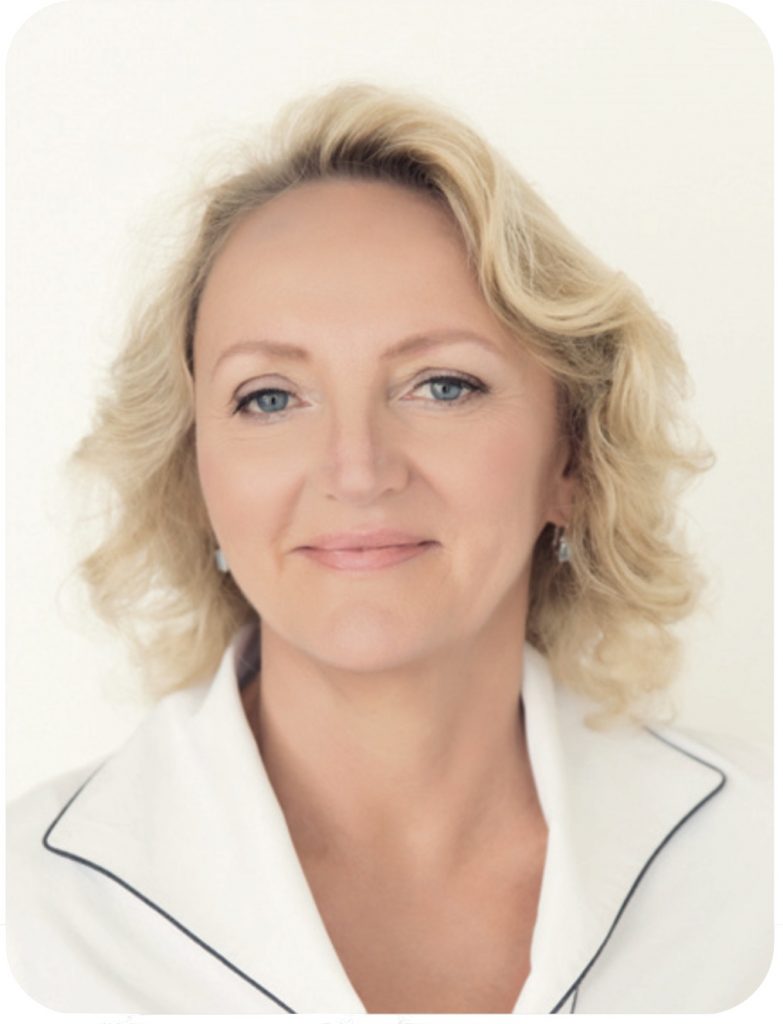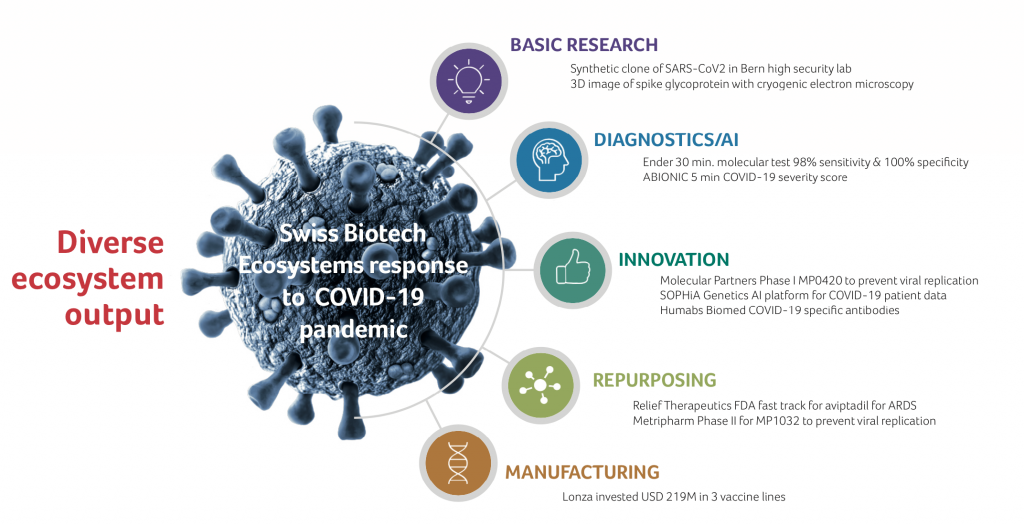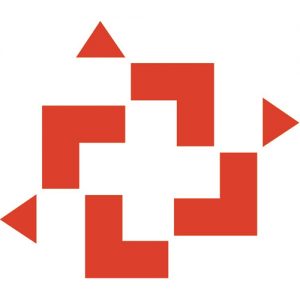- Get directions
- Leave a review
- Claim listing
- Bookmark
- Share
- Report
- prev
- next
- Tuesday, April 20, 2021 @ 10:00 am
The Swiss biotech ecosystem’s response to the COVID-19 pandemic was swift and encompassing. From the cloning of the virus, to the repurposing of established drugs and the development of COVID-19 specific diagnostics, therapeutics and the manufacturing of vaccine candidates, Switzerland is playing an important role in the global effort to combat the pandemic.

Michael Altorfer
Swiss Biotech Association | CEO

Marta Gehring
Swiss Biotech Association | Western Switzerland & Special Projects
Key to this active role of Switzerland is the country’s all-round life science expertise based on a thriving diversified ecosystem that delivers innovation, power and enables impact on a global basis. This ecosystem facilitates the integration of basic science and research in both established and new areas such as gene editing, cell-based therapies and artificial intelligence. At the same time, it can rely on decades of infrastructure development and global manufacturing expertise and distribution power.
Basic science
Early in March 2020, a Swiss high security lab in Mittelhäusern near Bern was set up to produce the first synthetic clone of SARS-CoV-2. This allowed researchers to study the importance of its individual genes with the objective of identifying mechanisms to weaken the virus and hinder its progression. This accomplishment received worldwide attention with labs and companies the world over requesting the clone to support their research.
Just two months after the discovery of the virus, American scientists were able to reproduce a 3D image of SARS-CoV-2’s spike glycoprotein protein using the cryogenic electron microscopy technique. Developed by Swiss biophysicist and 2017 Nobel Laureate in Chemistry, Jacques Dubochet, this technique provided an essential scientific insight which previously would have taken up to 10 years to achieve.
Diagnostics
While established players such as Roche and Quotient took leading roles worldwide in COVID-19 testing, numerous other companies soon started to contribute with innovative solutions (see also article by Jan Lucht of scienceindustries and the biotechnet article).
Bern based Ender Diagnostics launched a rapid molecular testing technology for COVID–19. This test delivers results within 30 minutes after the extraction of the viral RNA, with a sensitivity of 97.7% and a specificity of 100%.
ABIONIC in Lausanne launched the 1st COVID-19 severity score: this newly CE-marked test can quantitatively assess the severity of COVID-19 in just five minutes to enable rapid, objective patient triage.
To provide some context for the different diagnostic technologies and solutions being developed for COVID-19, Geneva-based FIND (Foundation for Innovative New Diagnostics) is collating an overview of SARS-CoV-2 tests that are commercially available or in development for the diagnosis of COVID-19.
The presence of international institutions such as the WHO in Switzerland is also supporting and complementing Switzerland’s significant role in this pandemic.
Drug repurposing
The world’s growing knowledge of the virology and clinical presentation of COVID-19 has widened the pool of pharmacological targets. In particular, it has increased interest in drug repurposing to either inhibit SARS-CoV-2 replication or to counteract the effects of a massive cytokine release that causes acute respiratory distress syndrome (ARDS) and coagulopathy. (See Janet Sultana, Challenges for Drug Repurposing in the covid-19 Pandemic Era. Front. Pharmacol., 06 November 2020 | https://doi.org/10.3389/fphar.2020.588654)
Geneva based Relief Therapeutics has repurposed aviptadil, a vasoactive intestinal polypeptide (VIP) analog with a 20-year history of safe use in humans in multiple human trials for sarcoidosis, pulmonary fibrosis, asthma/allergy, and pulmonary hypertension. In November 2020, the drug was granted FDA Fast Track Designation, FDA emergency use IND authorization, and an expanded access protocol for the treatment of Respiratory Distress Syndrome (ARDS).
Zurich based Metripharm normally focuses on drug development for chronic inflammatory diseases but is now busy with a Phase II clinical trial for MP1032, a reactive oxygen species (ROS) scavenger which the company believes is well suited to inhibiting SARS-CoV-2 virus replication.
Innovation
Molecular Partners, based in Schlieren, Zurich, develops antibody mimetic proteins in oncology (DARPins), but has swiftly added MP0420 to its portfolio. This is a custom-built protein with potential efficacy both as a prophylactic and as an acute therapy for COVID -19. MP0420 is designed to bind the receptor-binding domain of the SARS-CoV-2 spike protein at three distinct locations to prevent entry into cells.
The candidate underwent Phase I safety trials in November 2020, while future production and commercialization was being developed through an option and license agreement with Novartis AG. The ecosystem is coming together, linking innovators to global players like Novartis.
Manufacturing collaboration
In May last year, Basel based Lonza and Moderna announced their worldwide strategic collaboration to manufacture Moderna’s vaccine (mRNA-1273). This has led to Lonza building three vaccine production lines in Visp (Valais), at a cost of approx. USD 200M, designed to supply 300 million doses annually.
More recently, Lonza announced that it is collaborating with AstraZeneca to provide capacity for the manufacturing of AZD7442, a long-acting antibody now in Phase III for the prevention and treatment of COVID-19.
Moving swiftly
Within months of the pandemic becoming a worldwide calamity, Lausanne based SOPHiA GENETICS launched an AI platform to sift through data generated at more than 1,000 hospitals around the world to better understand how the COVID-19 pandemic is likely to evolve.
The data mining tool uses next-generation sequencing (NGS) to see how the genome of SARS-CoV-2 changes over time, along with patients’ genetic information, results of lung and CT scans, and other clinical data.
Less than six months passed between the announcement of the Lonza-Moderna vaccine agreement and the substantial manufacturing investment. Switzerland has been able to act swiftly because it could build on decades of experience, established platform technologies and a truly global network of collaborators in research, manufacturing and product development industry circles.
Working across domains
During 2020, Swiss companies continued to achieve significant milestones above and beyond COVID-19.
In October 2020, newly founded VectivBio closed USD 110M crossover financing on top of the USD 35M raised in January. The latest financing enabled the company to move forward with its Phase III program for apraglutide, a glucagon-like peptide-2 (GLP-2) analog to treat short bowel syndrome (SBS).
The mRNA field has made very significant advances in the last years, and Basel-based Versameb is likely to get a boost for its mRNA platform on the back of the Pfizer/BioNTech vaccine delivering nanoparticle encapsulated synthetic mRNA of the SAR-CoV-2 spike proteins.
Versameb has developed new ways to modulate disease translation with its VERSagile technology platform designed to produce several new molecular entities with different tissue specificity – all for one biological target.
Finally, Zurich based Neurimmune AG announced in October that the European Medicines Agency (EMA) had accepted Biogen’s marketing authorization application for aducanumab mAb for the treatment of Alzheimer’s disease. If approved, aducanumab would be the first treatment with the potential to meaningfully change the course of Alzheimer’s disease.
Neurimmune scientists discovered aducanumab working with researchers at the University of Zurich, demonstrating how the private/public partnerships that are so prevalent in Switzerland accelerate technology transfer.
Agility, Leadership and Innovation: A long Swiss tradition
Switzerland, known for its alpine beauty, independence, stable economy and neutrality, continues to top major international rankings for innovation - see the article on Global Innovation Index 2020 by Christian Moser and Anna Maria Villa.
Continuing to ride the innovation wave also requires sacrifices and an acceptance of change. Over the centuries and with each new wave of innovation, the country has experienced creative destruction leading to reinvention and the revolutionizing of its economic fibre.

